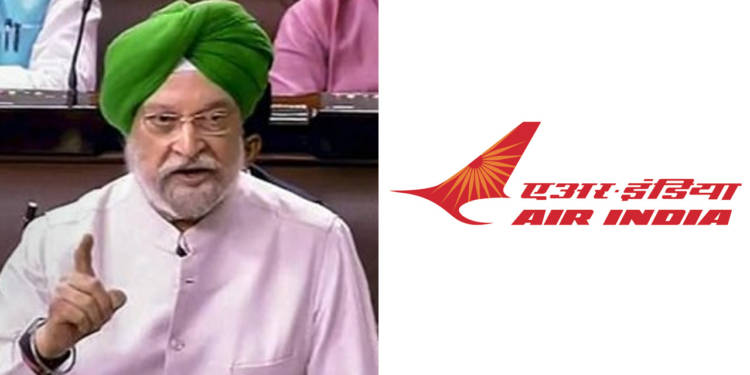The Modi government is trying to sale the Air India since last one and a half year, but unable to meet any success so far. There were speculations that- given the government is unable to find a buyer, it might continue the operations of the carrier despite the huge loss posted by the company.
Hardeep Singh Puri has put an end to these speculations in the Parliament on Wednesday.
Air India, the national carrier of the country will be closed down if not privatized, said minister of civil aviation, Hardeep Singh Puri.
“The airline will have to close down if it’s not privatized,” Hardeep Singh Puri told the Indian parliament on Wednesday. “Once we invite bids, then we’ll see how many bids will come in.”
The debt-ridden carrier which employs more than 10,000 employees is burdened with 50,000 crore rupees debt. The cumulative loss of the company is 70,000 crore rupees and the loss for the fiscal year 19 was 7,600 crore rupees.
Air India, one of the few legacies of the Nehruvian economy, still operating in the country is set to be finally privatized by the Modi government.
Earlier the government set up a Special Purpose Vehicle (SPV) named Air India Assets Holding to transfer the loans of 29,464 crore rupees. The four subsidiaries of the publically owned carrier which will be transferred to SPV are Air India Air Transport Services (AIATSL), Airline Allied Services (AASL), Air India Engineering Services Ltd (AIESL) and Hotel Corporation of India (HCI).
The board of the SPV includes Air India CMD, Joint Secretary in the Civil Aviation Ministry, Expenditure Department, Department of Economic Affairs, Department of Investment and Public Asset Management (DIPAM) and Air India Director (Finance).
Modi government after coming to power in May 2014, made it very clear that ‘government has no business to do business’. The government has realized most of its disinvestment targets in the last four years. In fact, in the year of 2017-18, the government exceeded its disinvestment target of 1 lakh crore and reached to 1, 00,056 crore.
Since the initial days of independence, India was a ‘confused economy’. The government kept the private players out from ‘big industries’ and operated with monopoly. However, small industries were kept open to the private sector. In 1991, the country started economic liberalization and opened the big industries for the private sector. But capitalism was based on favouritism and government was more ‘pro-business than being ‘pro-market’. Modi government is trying to make ‘New India’ a rule-based capitalist economy. The laws like Insolvency and Bankruptcy Code (IBC) are steps in this direction.

























